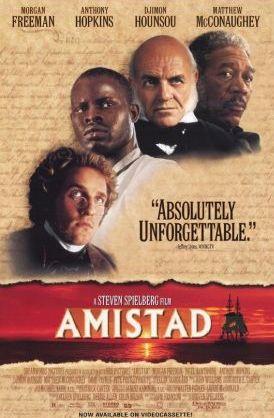
Amistad
R
Genre:
Drama
In Theaters:
1997-12-10 00:00:00.0
The film begins in the depths of the schooner La Amistad, a slave-ship carrying captured West Africans into slavery. The film's protagonist, Sengbe Pieh, most known by his Spanish name, "Cinqué," painstakingly picks a nail out of the ship's structure and uses it to pick the lock on his shackles. Freeing a number of his companions, Cinqué initiates a rebellion on board the storm-tossed vessel. In the ensuing fighting, several Africans and most of the ship's Spanish crew are killed, but Cinqué saves two of the ship's officers, Ruiz and Montez, whom he believes can sail them back to Africa.
After six weeks have passed, the ship is running out of food and fresh water, and Cinqué is growing angry with Yamba who believes keeping the Spaniards alive is the only way to get back to Africa. During the night, they pass another vessel, carrying a group of wealthy English-speaking passengers having a dinner party on deck. The next day, they sight land. Unsure of their location, a group of African men takes one of the ship's boats to shore to fetch fresh water. While there, La Amistad is found by a military vessel bearing an American flag - the Spaniards have tricked the Africans by sailing directly for the United States.
Captured by the American Navy, the Amistad Africans are taken to a municipal jail in New Haven, Connecticut, where the ship's occupants, and a tearful Cinqué, are thrown into a grim dungeon, awaiting trial.
The film's focus now shifts to Washington, D.C., where a session in the House of Representatives introduces John Quincy Adams (Anthony Hopkins), the elderly former President and politician. While strolling in the gardens, Adams is introduced to two of the country's leading abolitionists; the elderly freed slave Theodore Joadson (Morgan Freeman) and Christian activist Mr. Tappan (Stellan Skarsgård), both of whom are leading shipping magnates in New England and co-proprietors of the pro-abolitionist newssheet "The Emancipator". The two have heard of the plight of the Amistad Africans and attempt to enlist Adams to help their cause. Adams, apparently verging on senility, refuses to help, claiming that he neither condemns nor condones slavery. News of the Amistad incident also reaches current President of the United States, Martin Van Buren (Nigel Hawthorne), who is bombarded with demands for compensation from the juvenile Spanish Head of State, Queen Isabella II of Spain (Anna Paquin). At a preliminary hearing in a district court, the Africans are charged with "insurrection on the high seas", and the case rapidly dissolves into conflicting claims of property ownership from the Kingdom of Spain, the United States, the surviving officers of La Amistad, and the officers of the naval vessel responsible for re-capturing the slave-ship. Aware that they cannot fight the case on moral grounds, the two abolitionists enlist the help of a young attorney specialising in property law; Roger Sherman Baldwin (Matthew McConaughey).
At the jail, Baldwin and the abolitionists, along with a nervous Professor of Linguistics, attempt to talk to the Amistad Africans, but neither side is able to understand anything the other party says. In the prison, events among the Africans are accelerating. Yamba, Cinqué's apparent rival for authority amongst the Africans, has converted to Christianity and is now resigned to his death, believing that execution will send them to a pleasant afterlife. The death of a young man provokes the Africans into a furious demonstration against the American authorities, screaming and chanting in their native languages as a prison riot threatens. As the hearings drag on, Baldwin and Joadson regularly walk round the city docks, counting numbers in the Mende language, in an attempt to recruit an interpreter. They eventually happen upon a black sailor in the Royal Navy, James Covey (Chiwetel Ejiofor).
Using Covey's linguistic abilities, Baldwin and his companions are able to talk to Cinqué. In his first speaking role in the courtroom, Cinqué, through a series of flashbacks, tells the haunting story of how he became a slave.
Cinqué, a peasant farmer and young husband and father in West Africa, was kidnapped by African slave-hunters and taken to the slave fortress of Lomboko, an illegal facility in the British Protectorate of Sierra Leone. There, he and hundreds of other captured Africans were loaded onto transatlantic slave-ship (Tecora). Cinqué tells of the various horrors of the Middle Passage, including frequent rape, horrific torture, and random executions carried out by the crew, including the deaths of fifty people deliberately drowned in order to save food. Upon their arrival in Cuba, Cinqué was sold at a slave market and purchased, along with many other Tecora survivors, by the owners of La Amistad. Once aboard La Amistad, Cinqué was able to free himself of his shackles, and began the slaves' rebellion for freedom.
The courtroom drama continues as District Attorney William S. Holabird (Pete Postlethwaite) and Secretary of State John Forsyth (David Paymer) press their case for property rights and dismiss Cinqué's story as a mere piece of fiction. While exploring the impounded vessel La Amistad for much-needed evidence to support the Africans' claims, Baldwin happens upon a notebook, stuffed into a crevice by Ruiz and Montez to conceal the evidence of illegal slave-trading. Using the book as hard evidence of illegal trading, Baldwin calls expert witnesses including Captain Fitzgerald (Peter Firth), a British naval commander assigned to patrol the West Africa coastline to enforce the British Empire's anti-slavery policies. As Fitzgerald is cross-examined by the haughty Holabird, tension in the courtroom rises, ultimately prompting Cinqué to leap from his seat and cry "Give us us free" over and over, a heartfelt plea using the English he has learned. Cinqué's plea touches many, apparently including the judge - in a court ruling, Judge Coglin (Jeremy Northam) dismisses all claims of ownership, rules that the Africans were captured illegally and not born on plantations, orders the arrest of the Amistad's remaining crew on charges of slave-trading, and authorizes the United States to convey the Amistad Africans back to Africa at the expense of the nation.
While Cinqué, Joadson, Baldwin, and the jubilant Africans celebrate their victory, a state dinner at the White House threatens to overturn the ruling. While conversing with the Spanish Ambassador to Washington, Senator John C. Calhoun launches into a damning diatribe aimed at President Van Buren, emphasising the economic importance of slaves in the South, and ends his tirade with a concealed but clear threat that should the government set a precedent for abolition by releasing the Amistad Africans, the South will have little choice but to go to war with the north. With his advisors warning that the Amistad incident could bring the United States one big step closer to civil war, President Van Buren orders that the case be submitted to the Supreme Court, dominated by its Southern slave-owning judges. Furious, Mr. Tappan splits with Joadson and Baldwin, who break the news to an enraged and disgusted Cinqué. In need of an ally with legal background in the intricacies of Supreme Court workings, Baldwin and Joadson meet again with John Quincy Adams, who has been following the case carefully. Adams, aware that Cinqué is now refusing to talk to Baldwin, invites the African leader to his home. While Adams gives him a rambling tour of his greenhouse, Cinqué's emotional reaction to seeing a West African violet, native to his homeland, convinces Adams to assist the case.
At the Supreme Court, John Quincy Adams gives a long and passionate speech in defense of the Africans. Arguing that if Cinqué were white and had rebelled against the British, the United States would have exalted him as a hero; and that the Africans' rebellion to gain their freedom was no different to the Americans' rebellion against their oppressors some seventy years earlier. Arguing that condemning the Amistad Africans would render the principles and ideals of the Constitution worthless, he exhorts the judges to free the Africans, stating that the looming threat of civil war will simply be the final battle of the American Revolution. His case made, the United States awaits the Supreme Court's ruling.
On the day of judgement, Justice Joseph Story (Harry Blackmun) announces the Supreme Court's decision on the case. Believing that the Amistad Africans were illegally kidnapped from their homes in Africa, United States laws on slave ownership do not apply. Furthermore, since that was the case, the Amistad Africans were within their rights to use force to escape their confinement. The Supreme Court authorizes the release of the Africans and their conveyance back to Africa. Legally freed for the second and final time, Cinqué bids emotional farewells to his companions; shaking Adams' hand, giving Joadson his most treasured possession, a lion tooth which is his only memento of Africa, and thanking Baldwin in English. As Cinqué is about to leave, Baldwin clasps Cinqué and bids a farewell, in the Mende language, to the African leader.
The end of the film depicts various scenes. Royal marines assault the Lomboko Slave Fortress, killing the slavers and freeing the kidnapped Africans held within the dungeons. With the fortress evacuated, Captain Fitzgerald, who has finally located the fortress, orders his warship of the Royal Navy's West Africa Anti-Slavery Squadron to open fire on the facility, destroying Lomboko. Interspersed with this are scenes of Martin Van Buren losing his election campaign. The final, much more sorrowful scenes, depict Cinqué and the freed Africans returning to Africa, dressed in white, the West African colour of victory and accompanied by James Covey, who has shed his British uniform in exchange for African attire. Scenes depict Queen Isabella's attempts to gain compensation for La Amistad, and the end of slavery in the United States prompted by the Confederate Army's defeat at Atlanta. In the final, emotional scene, it is revealed that Cinqué returned to his village in Africa to find his people fighting a civil war, his home destroyed and his family sold into slavery.
Director:
Steven Spielberg
Screenplay:
David Franzoni
Studio:
Dreamworks
DVD Release:
1999-05-04 00:00:00.0
Tagline:
A true story.











